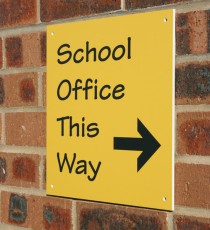Dealing with Difficult Parents at School
One of the most challenging tasks, even worse than having a root canal, is facing a difficult/irate parent in your office. As administrators, we know that we’ll have to deal with any parent from time to time. In those times of heated passions, how we react to the situation is very important. A miscalculated response can backfire; it can fan the flames of a parent’s upset and even burn bridges you’ve worked hard to build between the school and home. That’s why experienced principals use techniques aimed at extinguishing fires before they develop into full-fledged infernos.
The good news is that you’re not alone. Any job that involves providing services to others is going to unavoidably involve customer service issues. The only problem? We’re not really trained to deal with customer service issues. We’re trained to help kids learn to read, make friends, do math, manage their emotions, solve problems, follow directions, and become productive members of society. We don’t take classes on how to stay calm, friendly, and professional while being insulted, accused, or intimidated! So here are some strategies you can use to calm the fire, build rapport, and engage the parent’s problem-solving skills to better work together for the good of their child!
Quite often, the principal had no direct role in the original conflict. A faculty member did or said something to the parent or, more likely, his or her son or daughter, and the principal receives the brunt of the parent’s com-plaints. Being able to appropriately and effectively deal with parents in such situations is one of the most challenging tasks principals face, especially when the parents may be right. They are doing the best they know how fortunately, in most schools, only a few students are a real struggle.
On some occasions parents are determined to shelter their children for a variety of reasons. Nowadays more and more parents defend their children no matter whether they are right or wrong and no longer look to the school to provide knowledge-based decisions and recommendations that will prevent future problems. Instead, parents use a variety of defenses to divert the blame away from their children, which is unhealthy for the students and schools and inhibits any reasonable resolution. Who hasn’t heard a parent say it was the other’s child’s fault.
Dealing with Yourself
Dealing with difficult parents requires that principals first deal with themselves. There are few absolutes in education. Every rule has an exception and no matter how consistent principals attempt to be, there are times when plans must be adjusted. But however flexible principals must be about some things, there are a few absolutes that involve the principals’ own actions and approaches.
Effective principals never argue, yell, use sarcasm, or behave unprofessionally. The key word in that sentence is never. There are several reasons to adopt this credo. One of them is that in every situation there needs to be at least one adult, and the only person you can rely on to act as the adult is you. I also believe that it isn’t a good idea to argue with difficult people. You will not win. Difficult people may argue a great deal of time in every aspect of their lives. They argue at home, are confrontational at work, and probably have a great number of tense conversations on a regular basis.
One can control how many arguments one gets into. One also determines how often they yell or use sarcasm to make a point. Principals can teach others—students, parents, and faculty and staff members—new ways to interact, not merely polish others’ inappropriate skills. If Principals believe that the difficult people they encounter are doing the best they know how, then one of their missions should be to help them learn better behavior. As educators, principals have a responsibility to consistently model appropriate behavior to everyone with whom they come in contact. Principals should do so 100% of the time.
The one thing that Principals should never tolerate is verbal abuse of any kind. If a parent turns abusive, a Principal should remain polite but end the meeting. The Principal should tell the parent they can continue the conversation when the parent has better control. No one deserves abuse, not even a servant of the public.
Strategies for Better Relationships What can administrators do? How can an administrator deal with difficult parents? There are no easy answers, but the following proven strategies were suggested by experience school administrators to help diffuse difficult situations:
- Listen, and listen some more. The first thing a Principal should do when confronted by an upset parent is to smile and extend your hand. Then invite the parent into your office and offer a seat. “Doing that, helps make the parent feel respected, and it communicates that you are willing to listen and try to find a solution to whatever is on their mind,”
- Focus on the problem, not personality. Do not get defensive and don’t take iit personaly.
- Ask how the situation can be improved; apologize if in the wrong.
- Make only those promises you can keep.
- Use practical suggestions from parents as a springboard for action. Always try to offer alternatives, so the parent has some control over the situation and so there is a sense of shared decision making.
- Remember that parental anger may be due to interaction with a specific staff member, not due to either the parent or the teacher.
- Emphasize the “We” in the situation: “We all want what’s best for your child.” “What do you think we can do to deal with this problem?”
- Document, document, document, if an incident is not documented, it didn’t happen.
- Whether in person or on the phone, all encounters with parents who are angry or hostile should be handled with care.
- At the end of the meeting the Principal needs to summarize. The summary includes the basic issues, the positions of participants, and action steps (if any). The Principal should thank the parents for their interest in their child, and in the school and its programs.
Things Not to Do
Just as there are helpful behaviors to use when confronting hostile parents, there are a number of things to avoid. DO NOT!!!!
- Take the parent’s anger personally; the parent is probably upset about other events.
- Attribute motives to the parents. Undoubtedly there are factors you know nothing about.
- Defend yourself before the parents are finished speaking. It is counter-productive. Indeed, the very act of becoming defensive impedes communication.
- Believe that you have to meet “right away” at the parent’s insistence. Delaying the meeting will give you time to collect information and perhaps let the parent’s anger cool.
- Meet with the parents by yourself if you are afraid of them or if you want administrative backing, moral support, or someone to take notes; having another person or persons attend the meeting is perfectly acceptable.
- Be afraid to terminate the conference if the parents become verbally abusive or appear to be on the verge of a physical attack.
- Arrange the seating so that the parent is between you and the door.
- Have a meeting in an isolated area of the building.
- Meet alone with parents when everyone else has left the building.
- Be afraid to show the parents any notes you have taken about the meeting.
- Get sidetracked. The parent may attempt to steer the conversation to negative comments about co-workers or other parents. Don’t take the bait. Keep on the subject.
- Be afraid to apologize if you made a mistake that might make a parent justifiably angry.
DO STRONG SCHOOL COMMUNITIES YIELD FEWER PROBLEMS FOR ALL?
The school administration works hard to build a school community that focuses on the positive. Principals feel that if they established a relationship and build a community with families that are consistently focused on positive school news and child celebrations that parents and community members then feel like partners with the schools. A school community built on such a positive foundation helps principals deal with the difficult issues that arise from time to time. It is important that by the time a principal has to deliver difficult information to a parent, they should have already established a healthy relationship. Parents need to know that the schools value them as a partner and a valuable member of our school community. Creating a strong community takes some additional time and effort, but it is truly a case of an ounce of prevention being worth a lot of gold.
References
❏ Albright, C. (n.d.)Ten tips for managing conflict, tension and anger. Retrieved June 20, 2003, from http://mentalhealth.about.com/library/weekly/aa032601 a.htm
❏ Henderson, A. T. & Raimondo, B. N. (2001). Unlocking parent potential. Principal Leadership, 2(1),
❏ Whitaker, T., & Fiore, D. (2001). Dealing with difficult parents (and with parents in difficult situations). New York: Eye on Education.
❏EducationalWorld.com- Dealing with Angry Parents. The Principals Files.
❏National Association of Secondary School Principals
Dealing With Difficult Parents 46 P RINCIPAL L EADERSHIP PHOTO BY Todd Whitaker
❏ LEA Monograph Winter 2007 Dealing with Angry, Hostile Parents 12
❏ KATHY PIERCE AND LYNETTE FIELDS S CHOOLS & C OMMUNITIES 36 P RINCIPAL L EADERSHIP
















